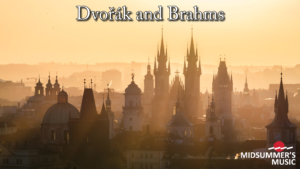 When you attend a Midsummer’s Music concert you know to expect a surprise or two. Sure, you’ll probably hear a tried and true, well-known masterpiece like the Brahms Piano Quintet that’s on our next program—one of the great masterpieces of chamber music. But you will also probably hear a fascinating work by an unknown composer like the Phantasie Trio by Alice Verne-Bredt that began our opening program over a week ago, or the String Octet by Woldemar Bargiel that is paired with the Mendelssohn Octet on our program that concludes Thursday at the Kress Pavilion. What fascinates me is how often these new discoveries delight our listeners. It’s not just that they appreciate the variety. It’s that our audience members are frequently touched in a uniquely emotional way by something they didn’t expect. They wonder why and how such a beautiful work could be hidden away and unappreciated. Sometimes it even evokes a kind of sadness that the composer and work could remain so unrecognized for so long.
When you attend a Midsummer’s Music concert you know to expect a surprise or two. Sure, you’ll probably hear a tried and true, well-known masterpiece like the Brahms Piano Quintet that’s on our next program—one of the great masterpieces of chamber music. But you will also probably hear a fascinating work by an unknown composer like the Phantasie Trio by Alice Verne-Bredt that began our opening program over a week ago, or the String Octet by Woldemar Bargiel that is paired with the Mendelssohn Octet on our program that concludes Thursday at the Kress Pavilion. What fascinates me is how often these new discoveries delight our listeners. It’s not just that they appreciate the variety. It’s that our audience members are frequently touched in a uniquely emotional way by something they didn’t expect. They wonder why and how such a beautiful work could be hidden away and unappreciated. Sometimes it even evokes a kind of sadness that the composer and work could remain so unrecognized for so long.
Well, what if the discovery were to be a masterpiece by a famous composer? No, sorry. That just doesn’t happen. Impossible! Imagine someone coming up with a new symphony by Beethoven or a new violin concerto by Tchaikovsky. It’s practically unthinkable—although we could wish. Well, sometimes wishes come true. Midsummer’s Music has a big surprise for you. A “new” work by everybody’s favorite, Antonín Dvořák. Yes, the composer of The Symphony “From the New World” is still giving us new treats.
Do I have your attention now?
Okay, here are the details. This Saturday evening, we are performing a concert at the home of Marianna Beck and John Wilson, Jr., in Fish Creek. When we were putting together our schedule and programs about six months ago, John suggested two wonderful pieces for their home concert, the Dvořák Piano Quintet in A Major, Opus 81, and the Brahms Piano Quintet in F Minor, Opus 34. Those are two great masterpieces that would certainly sound fantastic on their wonderful Steinway Piano in a home built for music. And, to have them played by Jeannie Yu, our wonderful pianist…? Splendidissimo! Well, yes—maybe…. Because, after I finished drooling over the prospect, I started thinking about the details. Length, for one thing. Both the Brahms and the Dvořák are in the range of 40-plus minutes. That makes for a very long program, especially when the evening includes a small reception beforehand and a dinner after. Not only that, but the Brahms – in particular – is a monster piece for any pianist. It is musically very satisfying, but it is something of an Olympian feat to perform. From experience over the years, I know that every pianist we have had has let me know, in one way or the other, that Brahms can be punishing to perform, and Jeannie is no exception. And, it’s not just one evening. Jeannie is doing six different programs with us this summer—a total of 20 performances and they include two concertos, the fabulous Grieg Concerto and a double concerto by Chausson with David Perry. To put it another way, a baseball coach has to be careful with his ace pitchers. They can’t pitch every game, as much as might be wanted, and sometimes it’s even good to take them out when you are ahead to give them a rest.
So, I started looking for a good alternative. I loved the idea of Brahms and Dvořák on the same program. They have so much in common. Brahms thought very highly of Dvořák and helped him get financial support and a publisher at a critical time in his career. They also both loved to include certain indigenous folk influences in their music—Hungarian and Gypsy flavors for Brahms and Dvořák’s heartfelt Czech impulses. So, I started looking at alternative works by Dvořák. Perhaps one of his Piano Trios, I thought. As I was perusing his list of works, I noticed something that I had not been aware of before. There, before my very eyes, was another Piano Quintet by Dvořák. Not the famous Opus 81, but one marked Opus 5. It was also in A Major. What was this? I had always thought of Opus 81 as being Dvořák’s only piano quintet. (And, I take some comfort in finding that I am not the only one). None of our musicians, all thoroughly acquainted with Dvořák’s chamber music (so I thought), knew of this work either.
Then comes the question, can it be any good and be so unknown? Very often, when you come upon such a work by a famous composer it is unfinished, or a piece of juvenilia, or something they wrote after they went mad. In other words, it’s an intriguing historical footnote—a sadly “if only….” Well, not so with Mr. Dvořák’s FIRST Piano Quintet, Opus 5. It happens that he was 31 when he wrote the piece, it is completely finished, and he was fully in possession of all his mental faculties, thank you. Now Dvořák was something of a late bloomer, but this work comes from just before Brahms discovered him. Dvořák entered a composition contest with some Moravian Songs. Brahms was one of the judges of this competition, and he was quite taken with what Dvořák had written. The rest, as they say, is history. Dvořák won a prize, which gave him some much-needed money, but it also gave him the imprimatur of Brahms who began to extol Dvořák’s virtues as a composer and introduced him to his publisher. These initial publications and some that soon followed began to attract attention to the Dvořák, who was now capable of creating real mature masterpieces.
Now, Dvořák was not terribly happy with his Piano Quintet at first, so he put it on a shelf and lost track of it. Some say he even destroyed it, but not before a violinist friend, who was a member of a string quartet, had copied the parts. Many years later, in fact, just a few years before Dvořák headed off to the New World where he would become even more famous, he decided he wanted to take another look at this earlier Piano Quintet. He contacted the violinist, got the copies, and started to revise it.
So, by 1888, we have a revised version of a work written 14 years earlier, but, despite the extra attention and as many as 150 measures removed from the original, Dvořák never heard the reworked version. In fact, Dvořák died in 1904, and the work had to wait until 1922 for its first performance! Worse yet, it was not published until 1959. So now maybe you are beginning to see why it is not so well known and is still infrequently performed. We are happy to help remedy that situation with these performances, and when I say “we,” I am reiterating the joy that our players for this program have expressed over the opportunity to get to know this work and share it with our audiences. Jeannie Yu introduces the work to our audiences with some remarks before sitting down to play it, and it is clear she is very fond of the work, not only from what she says but how she plays it.
If you want to hear this work and the Brahms, you should probably act quickly because there are only two open performances left. We have performed it once already to a full house at St. Luke’s in Sister Bay, and the Beck/Wilson home concert is sold-out. Tickets are still available at Shepherd of the Bay Lutheran Church in Ellison Bay on Friday, June 28, at 7:00 pm., and at Hope Church in Sturgeon Bay, Sunday the 30th at 5:00 pm. Opportunities like this don’t happen often, so I hope to see you there, and please stay for the reception after so we can share thoughts on this remarkable program. Call (920) 854-7088 or visit www.midsummersmusic.com for tickets or more information.
Jim Berkenstock,
Artistic Director
